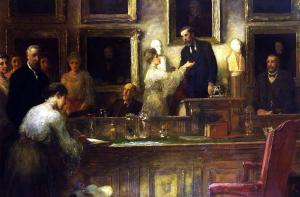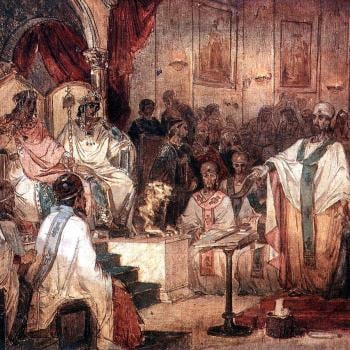
Some people think the way we should engage and follow tradition is to simply repeat what was done in the past. They turn the past into an idol, sacrificing social and moral advances as they force society to conform to their ideological expectations for it. Tradition is important. Learning from the past is important, especially learning from the mistakes of the past so we do not repeat them. Tradition should be living, and as such, continue to develop, just as anything which is alive constantly develops and changes. This does not mean changes will be or should always be radical; society should change to meet the present context, taking all the wisdom it has, including the wisdom of the past and what has been learned in the present, and use it to try to develop a more just and compassionate world. We must not assume the ways things were done in the past were always good, as much was not good. This can be seen in the way women were often mistreated and abused due to the social conditions they found themselves living in.
In contemporary debates about society, many suggest the problems of modern society come from the way so-called traditional gender roles have been rejected. They act as if those roles are universal, and are self-authenticating because of their universality. However, those roles were developed and established over time, and if we examined history in detail, many roles assumed to be traditional only represent what has been established in the recent past and then generalized as representing the norm of history. Similarly, the social policies which helped form and establish such roles have behind them a dangerous ideology, one which absolutizes a difference between men and women and in doing so undermines the dignity of women as they are seen to be inferior to, and so naturally subservient to, women. Behind the formation of such a viewpoint is a sinful social construct, one which not only marginalizes women, but also hurts the men who promote it. For, as St. Edith Stein pointed out, many Christians turned gender roles into a master-slave situation, where men were seen as masters, and women were meant to serve the whims of men, but in doing so, men fell in line and became slaves to sin:
But the relationship between the sexes since the Fall has become a brutal relationship of master and slave. Consequently, women’s natural gifts and their best possible development are no longer considered; rather, man uses her as a means to achieve his own ends in the exercise of his work or in pacifying his own lust. However, it can easily happen that the despot becomes a slave to his own lust and thereby is a slave of the slave who must satisfy him.[1]
St. John Paul II, following St. Edith Stein, acknowledged the social conditioning which had developed in Christian history often hindered women and their spiritual development. He pointed out and apologized for the way many influential Christians (including priests, bishops, and popes) helped establish and preserve those conditions:
Unfortunately, we are heirs to a history which has conditioned us to a remarkable extent. In every time and place, this conditioning has been an obstacle to the progress of women. Women’s dignity has often been unacknowledged and their prerogatives misrepresented; they have often been relegated to the margins of society and even reduced to servitude. This has prevented women from truly being themselves and it has resulted in a spiritual impoverishment of humanity. Certainly it is no easy task to assign the blame for this, considering the many kinds of cultural conditioning which down the centuries have shaped ways of thinking and acting. And if objective blame, especially in particular historical contexts, has belonged to not just a few members of the Church, for this I am truly sorry.[2]
Paul Evdokimov suggested one way Christians caused this problem can be found in the way many of them read and interpreted Scripture:
Exegesis most frequently understands the biblical story of the creation in a very masculine sense. The woman was created for the man as a servant, a helper, an object; she makes him complete. Nietszche drew the logical inference from this: “Woman is the diversion of the warrior.” The metaphysical flight of Kierkegaard, the fearsome fate of Don Juan, and the superhuman loneliness of Nietszche lead to Goethe’s pragmatic wisdom. Women accompanied him during his life, but they were only instruments of his artistic work. The concrete being rises to heaven like a most brilliant star; the feast is illuminated, then comes the eclipse. [3]
This led to the belief that what was masculine was good and strong, while what was feminine was weak and contemptible:
From the heavenly Father, to whom popular imagination or simplistic catechisms give distinctively masculine features, to the natural father, who reflects divine authority in the eyes of the child, a woman grows accustomed to respecting masculine virility with emotional admiration. Educators never fail to characterize as “feminine” everything that is weak and inferior, and as “masculine” everything that is courageous, great, and has human value.[4]
With such an attitude, women were broken down, their value and dignity marginalized, and it was said, if they ever had power or authority, if they were freed from submission of men, their natural weakness and inferiority led to moral and social decay. Many tried to prove this by the way women seemed to have contributed little to the history of human intellectual development. Evdokimov, responding to this, pointed out why this is a disingenuous response:
A common objection to the feminist movement is based upon woman’s supposed lack of creative ability. Genius is often viewed almost exclusively as masculine. While women are scientists and great artists, there are almost no women composers. But to judge woman’s contribution to culture equitably, we must examine the historical conditions affecting it.[5]
Women cannot be, and must not be, forced into so-called “traditional roles” when such roles undermine their worth and dignity. They have much to contribute to society, and should not only be encouraged to do so, they should be given the means to do so:
This is a matter of justice but also of necessity. Women will increasingly play a part in the solution of the serious problems of the future: leisure time, the quality of life, migration, social services, euthanasia, drugs, health care, the ecology, etc. In all these areas a greater presence of women in society will prove most valuable, for it will help to manifest the contradictions present when society is organized solely according to the criteria of efficiency and productivity, and it will force systems to be redesigned in a way which favours the processes of humanization which mark the “civilization of love”.[6]
St. Edith Stein indicate how, until recently, only a few “radical” groups supported women and their desire to be treated with proper dignity and respect:
Woman’s personal capabilities and powers, often dwarfed without these opportunities for action, were to be liberated. Hence, the goal was one of individualism. Outside the extreme left, this demand met with lively resistance. “Woman’s place is in the home!” resounded from every side. It was feared that granting women’s demands would jeopardize feminine singularity and woman’s natural calling. On the other hand, these opponents maintained that woman was not qualified for masculine professions because of her singularity. [7]
Sadly, it seems, many who want to promote so-called traditional gender roles know what they are doing as they want society to think a woman’s primary place is in their home. Some even questions how much education women should be given because they think they do not need as much education as men in order to fulfill their role. The worst elements of patriarchy are treated as norms which must be accepted and reestablished. Silas House, for example, tells us how he was raised with this kind of sensibility, showing, moreover, its connection to Christian Nationalism:
I was raised in a church of terrorists. The preacher pounded on the lectern while he boomed that all queers deserved to die, that mixed marriages were going to lead to the downfall of “our way of life.” This was the 1980s, when women’s rights were being discussed much more broadly but according to him, God dictated that women were inferior beings to men. He railed against the separation of church and state, assuring us that the Founding Fathers had intended this to be a Christian nation. We were right and holy; the rest of the world was evil and against us. Worst of all, the congregation applauded and hollered “Amen!” in response.[8]
It is the attitude which continues to be promoted by those representing themselves as Christian Nationalists, including by many women such as Marjorie Taylor Greene. She said women are the inferior sex due to a poor interpretation of Genesis “We came from Adam’s rib. God created us with his hands. We may be the weaker sex, we are the weaker sex, but we are our partner’s, our husband’s wife.”[9] And, as various polls indicate, those who view themselves as Christian Nationalists tend to think along similar lines, that is, they accept the notion that what is feminine is to be seen weak and inferior, and so should have less influence over society:
Around four out of ten Americans (38%) believe that “society as a whole has become too soft and feminine,” while 59% disagree. At least six in ten Christian nationalism sympathizers (60%) and adherents (66%) agree with this statement. Here too, there are only modest differences among white and non-white sympathizers and adherents.[10]
What St. John Paul II, St. Edith Stein, Paul Evdokimov and many others said was a problematic aspect of Western tradition, the mistreatment of women based upon the presumption that there was something inferior to the feminine, can be seen being promoted in Christian Nationalistic circles. This is why polls suggest a majority of self-proclaimed Christian Nationalists embrace such a misogynist viewpoint. Unless it is specifically confronted and rejected by Christians, this ideology will continue to grow and be promoted by more and more Christians as it will become the dominant rhetoric Christians hear (due to the fact those who promote it are extremely vocal and promoted in social media). As a result, everyone will suffer, for women will not be able to be who and what they can be, and without their full contribution to society, the gifts they have been given, as particular persons in their own right, will be lost to society.
The traditional mistreatment of women has been a problem around the world; that is, we must recognize it is not only a Christian problem. However, where Christianity has had more cultural ties with the society at large, such as in the United States, Christians must vocally support and help for the transformation of society, to overcome the idolization of the past and the way it treated women. Until they do, they should not be surprised if women will question Christianity when they see the difference between the claims of Christianity and the way it is supposed to liberate people from the slavery of sin and the social conditions established by sin with the reality in which those conditions are actively promoted and supported by Christians. Christian history has much to account for in regards the way it has marginalized women. Christians must clearly denounce the mistakes of the past so that tradition can develop and promote liberation and freedom for all. Those do otherwise will continue to be a cause of scandal as they deny the fullness of Christian teaching and the way it says in Christ, there is neither male nor female, as they absolutize and difference and use it to undermine the dignity of women.
[1] St. Edith Stein, “The Separate Vocations of Man and Woman According to Nature and Grace,” in Essays On Woman. Trans. Freda Mary Oben, PHD (Washington, DC: ICS Publications, 1996), 72.
[2] St John Paul II, Letter to Women (6-29-1995). Vatican translation. ¶3.
[3] Paul Evdokimov Woman and the Salvation of the World. Trans. Anthony P Gythiel (Crestwood, NY: St Vladimir’s Seminary Press, 1994), 174.
[4] Paul Evdokimov Woman and the Salvation of the World, 180.
[5] Paul Evdokimov Woman and the Salvation of the World, 177.
[6] St John Paul II, Letter to Women, ¶4.
[7] St. Edith Stein, “Women’s Value in National Life,” in Essays On Woman. Trans. Freda Mary Oben, PHD (Washington, DC: ICS Publications, 1996), 254.
[8] Silas House, “The Christian Nationalist Forces That Terrorized Me as a Child Have Grown Only More Powerful” in Time (11-7-2022).
[9] Quoted in Maroosha Muzaffar, “Marjorie Taylor Greene Mocked Over Her Definition Of A Woman – The ‘Weaker Sex’ Created From Adam’s Rib” in The Independent (4-5-2022).
[10] PRRI Staff, “A Christian Nation? Understanding the Threat of Christian Nationalism to American Democracy and Culture” in PRRI (2-8-2023).
Stay in touch! Like A Little Bit of Nothing on Facebook.
If you liked what you read, please consider sharing it with your friends and family!
N.B.: While I read comments to moderate them, I rarely respond to them. If I don’t respond to your comment directly, don’t assume I am unthankful for it. I appreciate it. But I want readers to feel free to ask questions, and hopefully, dialogue with each other. I have shared what I wanted to say, though some responses will get a brief reply by me, or, if I find it interesting and something I can engage fully, as the foundation for another post. I have had many posts inspired or improved upon thanks to my readers.













